Movie Review – Alexander (Director’s Cut)
Bold, epic, committed film version of the life of Alexander The Great is also a gargantuan misfire – somehow, not even Oliver Stone could make this film work (and he tried four times!). Colin Farrell is a great Alexander, and the rest of the cast do solid work, but the talky script and uneven narrative, lacking cohesive tone or even decent plot, makes for a clunky movie. The soaring score from Vangelis often feels more like elevator music, and Stone concocts some terrific battle sequences, but in the end, the audience can’t invest in anything because it just flat-out sucks.
– Summary –
Director : Oliver Stone
Year Of Release : 2004
Principal Cast : Colin Farrell, Val Kilmer, Angelina Jolie, Anthony Hopkins, Jared Leto, Rosario Dawson, Christopher Plummer, David Bedella, Fiona O’Shaughnessy, Brian Blessed, Gary Stretch, John Kavanagh, Nick Dunning, Joseph Morgan, Jonathan Rhys Meyers, Denis Conway, Neil Jackson, Rory McCann, Tim Pigott-Smith, Toby Kebbell, Connor Paolo, Elliot Cowan, Patrick Carroll.
Approx Running Time : 167 Minutes
Synopsis: The story of Alexander, King of Macedonia, as he strives to increase his kingdom by conquering the known world.
What we think : Bold, epic, committed film version of the life of Alexander The Great is also a gargantuan misfire – somehow, not even Oliver Stone could make this film work (and he tried four times!). Colin Farrell is a great Alexander, and the rest of the cast do solid work, but the talky script and uneven narrative, lacking cohesive tone or even decent plot, makes for a clunky movie. The soaring score from Vangelis often feels more like elevator music, and Stone concocts some terrific battle sequences, but in the end, the audience can’t invest in anything because it just flat-out sucks.
**********************
Fortune favors the bald.
When Oliver Stone’s biographical film of controversial historical figure, Alexander The Great, arrived in cinemas in 2004, it was met with the wet critical acclaim of a sodden turd. Bereft of audience investment and scorned by both critics and casual audiences (because critics aren’t “casual audiences”, apparently), Alexander suffered the ignominy of being nominated for a slew of Golden Raspberry awards, as well as being something of a box office bomb, only barely making back its production budget of $155m. After such a dismal result, Warner Bros allowed Stone to return to the editing bay to produce a “Director’s Cut”, smoothing out many of the film’s troubling subplots, extraneous sequences, and other material audiences felt didn’t quite work. That was in 2005, a year after release. In 2007, Stone again went back to the well, this time throwing everything he liked into the film, producing a 214 (!) minute “Final Unrated Cut”, which restructured the film from the ground up, and added a whole heap of backstory into the narrative. Not content with this, Stone re-edited the film for a fourth time, producing the “Ultimate Cut”, in 2012, which was shorter than the “Final” cut, and once again tried to smooth out narrative lethargy and characterization troubles. Is Alexander the kind of film that warrants four distinct versions of the same film? Not one jot, if I’m honest, although it’s brave of both Stone and Warner Brothers to even try; at least they did try, something which can’t be said of a lot of film-makers today, content to release substandard material and actually call it “art”. Alexander might not be a success either financially or creatively, but the effort cannot be understated. While I lacked the dedication to really go the whole hog in watching all 4 versions of this film, I felt qualified enough with this Director’s Cut to give it a shake on DVD and reappraise a story now a decade old, see if it still stinks like it did originally.
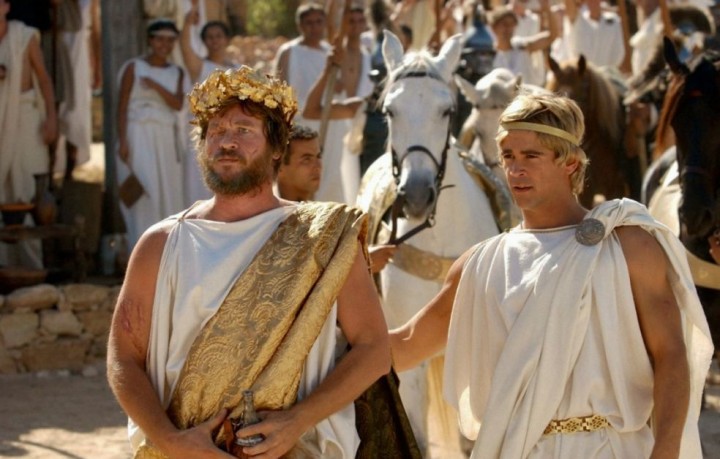
It’s 330 BC, and Macedonian king, Alexander (Colin Farrell), is engaged in his conquest of the Persian Empire (today’s Middle East, Egypt, Turkey and into Iran and Iraq). Driven by the legacy of his alcoholic, abusive father, King Phillip (Val Kilmer), and the urgings to greatness of his mother, Queen Olympias (Angelina Jolie), Alexander and his forces head further and further east, towards Asia, as they seek to conquer Babylon and the Indian empire. The film looks at the relationship between Alexander, his friend (and lover) Hephaistion (Jared Leto), and his desire to father heirs through marriage to Bactrian Princess Roxana (Rosario Dawson), all while balancing his obsession with removing himself from his father’s long shadow.
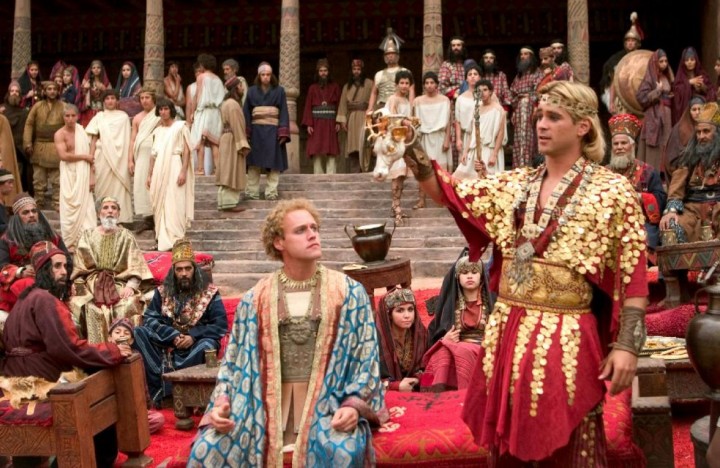
Alexander is Oliver Stone’s magnum opus, at least in terms of scope and size. Better known for Platoon, JFK and Wall Street, Stone eschews his usual political commentary to make his own Braveheart, a monumental CG-lit epic depicting the ancient world in all its brutal, fascinating glory. Alexander is nothing if not commendable for its endeavor. Sure, it fails utterly in that endeavor, but you have to applaud Stone for taking such a gamble. Not to many people would know the intricacies of Alexander The Great’s life, unless they’d studied him at school, and while it’s fair to say that the man himself probably will remain an enigma regardless of Alexander’s existence, Stone’s valiant attempt to cinema-fy the legendary historical figure holds nothing back in its effort to do bring his life to the big screen.
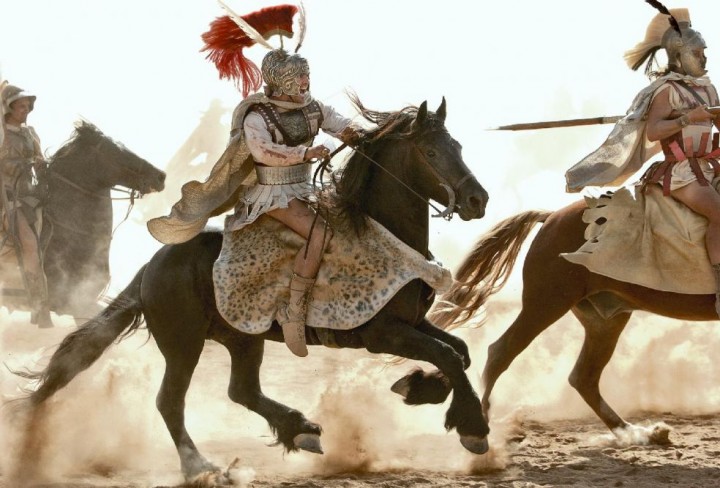
Alexander is a troublesome movie indeed, in terms of character, momentum, and overriding point. Alexander himself is something of an enigma, a fact Stone attempts to alleviate through research and some mild associative reasoning. The film is essentially dual-pronged in its narrative aspects; on one side, Alexander’s fractured relationship with his father, the vile Phillip, played by Val Kilmer under some fairly chuckle-worthy makeup, and his snake-like mother, a Cleopatra-clone in Queen Olympias, played by Angelia Jolie. The other side of the story deals with Alexander’s inability to escape his father’s shadow, made redolent by his refusal to discontinue his expansionist regime, dragging his troops to the ends of the Earth in search of glory and victory, with his homosexuality a contributing factor in his personal emotional confusion. It’s a pity that neither aspect of the film really congeals to work as a whole, instead rendering both arcs inert, lacking cohesion, and offering scant audience involvement with the man’s emotional core.
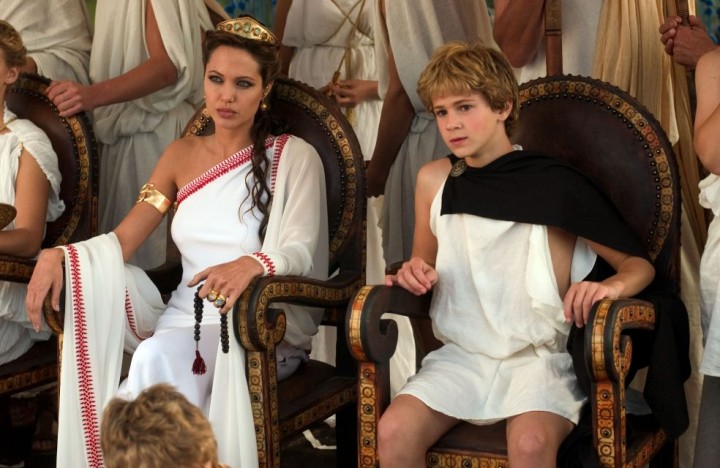
The film is, in it’s Director’s Cut format at least, told through a series of interlocking flashbacks – childhood and formative years are covered early, while Jolie and Kilmer appear as Alexander’s parents throughout the film in parallel arcs to the “present” narrative. The concurrent narrative allows aspects of Alexander’s personality to be revealed slowly, throughout the film, offering glimpses into his psyche borne from his backstory. It’s a nice way of presenting the film, although it still doesn’t work to bring the audience into the story. The film’s screenplay, by Stone, Laeta Kalogridis and Christopher Kyle, is at times incumbent on the actors to sift through the generic, historic “leave a lasting legacy” mantra which permeates much of these kinds of stories. You know, the old “What we do in life, echoes in eternity” type sword-clanging that rattles audiences and makes the events on-screen so important it makes your teeth ache. Problem here is, Alexander’s such a complex dude, so motivated by inner demons and external pressures, that a slight fumble in his representation means doom for the viewer. That’s not to say Stone and Co fumble the ball in making Alexander a compelling character, I just think they lost focus on making him approachable or relatable to modern audiences; by giving us every facet of the man ever written, they remove the dude from our sphere of understanding.
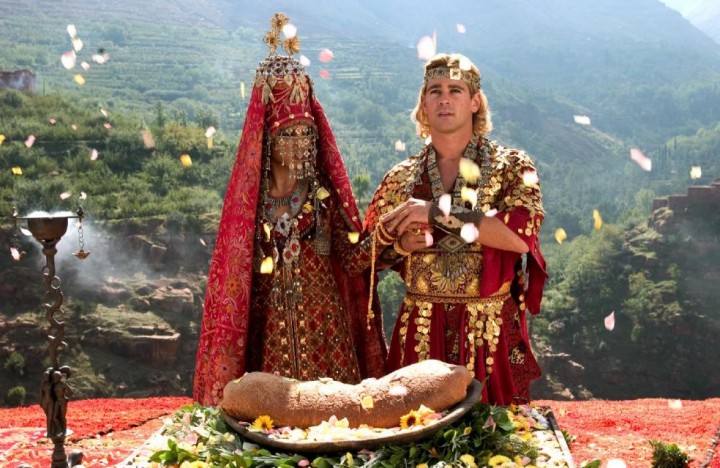
If I’m honest, the subplot with Alexander’s parents is redundant. At the very least, it’s not worth half a film’s story. Jolie and Kilmer are decent actors, and no doubt their roles were expanded to provide plenty of star-power to the already overburdened cast roster, but the limited development they undergo throughout the film begins to drag things down. Every time Stone cuts back to Alexander’s childhood, where Kilmer beats the crap out of him, or Jolie seduces him with power, the film seems to retread similar ground, and in the end, I started to delicately finger the fast-forward button on my remote control when either of them appeared. Instead of focusing solely on Alexander, the film spends a great deal of time trying to handle Kilmer, Jolie, as well as the numerous military commanders and their stories, as well as Alexander himself. It’s too much to take in. Had Stone stripped it back to the core essentials, with Alexander and his men traipsing across the countryside, dealing with all those problems, and left the “flashback” stuff for smaller tidbits of information, the film would not only have moved at a faster pace, but probably been a whole lot shorter.
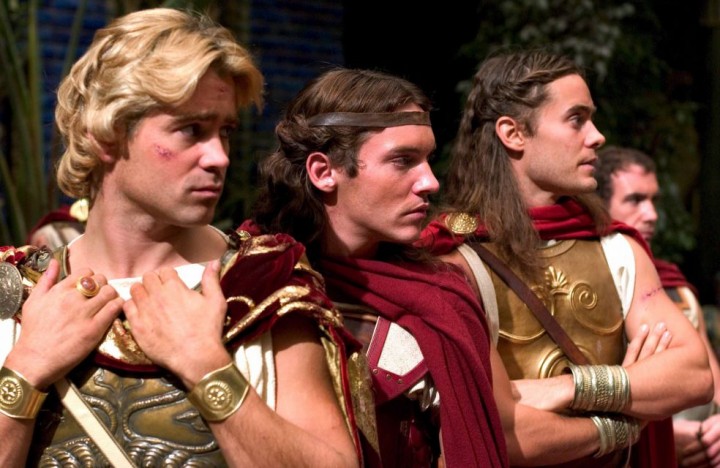
The film also suffers a lot with exposition, most of it random philosophizing from and aged Anthony Hopkins’ Ptolemy, a Greek General who served under Alexander, and through whom the majority of the story is told – he was there, after all. Hopkins spends most of his screen time waxing lyrical about Alexander’s greatness, as well as his flaws, and although Hopkins delivers a succinct, moving performance, the words seem to rng hollow, as if we’re meant to understand their importance by being told they’re important, rather than them actually being important. That slight difference is crucial. The opaque nature of Alexander’s drive to conquer isn’t well developed – at least not to my eyes – and considering it’s this that’s most important to the film, the fact it doesn’t hold up leaves Stone nowhere to go as a storyteller. All the talking and grand scheming in the world don’t mean jack if the audience isn’t invested in the characters, and with Alexander, we’re not.
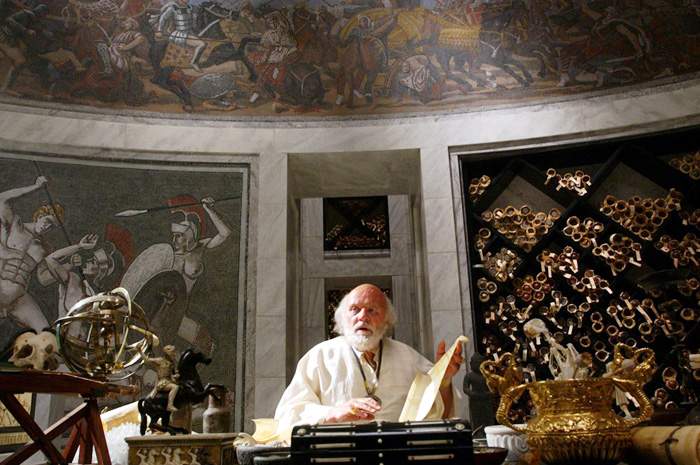
The bulk of the film’s cast do well with the material. Thespians like Jared Leto, Jonathan Rhys-Meyers, Elliot Cowan, John Cavanagh and Denis Conway are solid support to Farrell’s screen-grabbing turn as Alexander. Christopher Plummer has a minor cameo as Aristotle, once again turning the film into a philosophical diatribe against expansionism, or at the very least, classism, while poor Rosario Dawson is crucified by the screenplay’s misogynistic, unilaterally cliched effort to turn her character from “wild, untamed woman of Persia” into “wife of Alexander” through symbolic “taming”. Ugh. Spotting Game Of Thrones star Rory McCann, new Doctor Doom Toby Kebbell, and Vampire Diaries actor Joseph Morgan in amongst this cavalcade of actors was a nice surprise too.

But the trio of key performers, in Farrell, Jolie and Kilmer, have problematic thematic arcs that render the bulk of their material insufficient. Farrell, while obviously giving this one his all, can’t generate the magnetic, strong screen presence of, say, Mel Gibson in Braveheart, a film this film strives to be. While Alexander remains fairly aloof, almost indifferent to the story, Farrell’s portrayal of him is wide-eyed and semi-crazy. You get the sense that Farrell knew this was his Oscar bait film, and delivers a performance of extremes, both melodramatic and understated in equal parts, a schizophrenic portrayal that has more to do with the script and Stone’s direction that with Farrell himself. Jolie feels the most at home here, her smooth portrayal of Olympias perhaps the most vivid of all within the film. The screen smoulders whenever she’s on it, although Stone’s editing of her work here has kinks, and leaves her ultimate motivation something of a mysterious cover-all to a problematic script. Val Kilmer had a few barbs thrown his way from critics, and while some of the blame for his character’s bludgeoning insertion into the film is warranted upon Kilmer, most of it should be laid at the feet of Oliver Stone. Phillip feels more like a caricature rather than an actual person, and where Kilmer struggles is balancing the two.
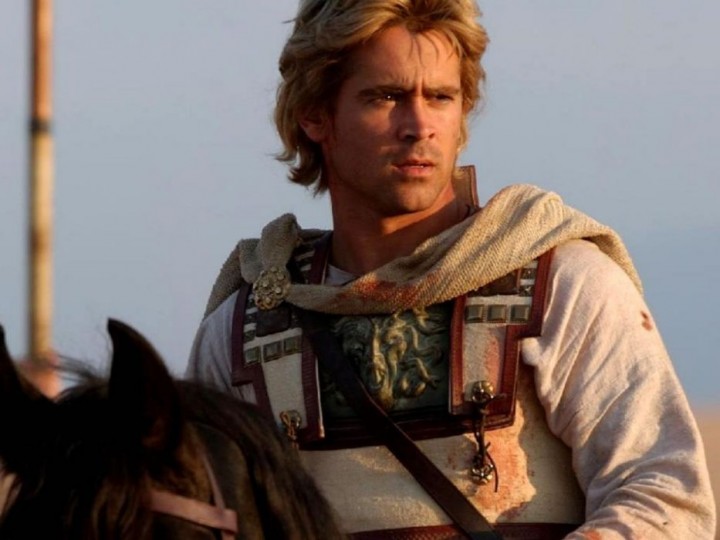
Colin Farrell famously said that Alexander was “a glorious failure”, and he’s pretty well spot on. All four iterations of this film have largely been derided as convoluted, bloated, cumbersomely scripted, and inordinatly unbalanced. The Director’s Cut, while at times exciting for the frenetic battle sequences, is hobbled by an overabundance of conceit and an inability for restraint. I know, asking for Oliver Stone to restrain himself is like asking Michael Bay to make a film without explosions, a task of impossibility – yet had Alexander been a little more restrained, a little more focused, and less haphazard in what it asked of the audience, it might have been a half-decent film.


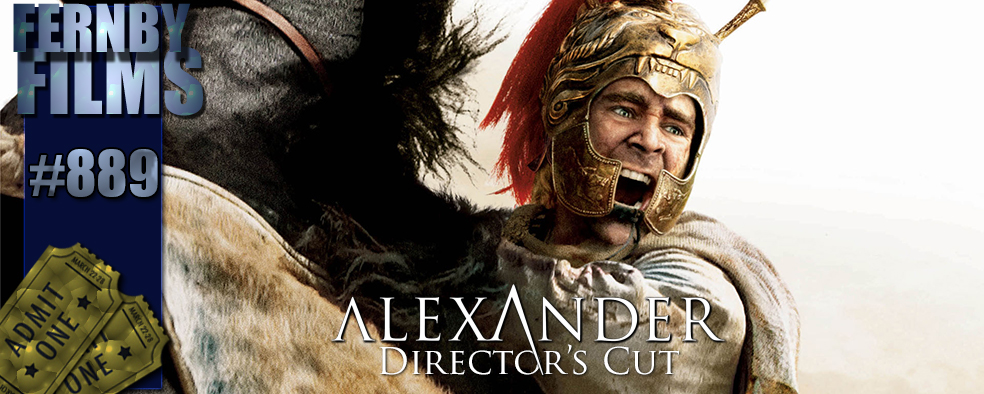










اون دوره هایی که ایران تو زوال حکومتی به سر میبرده همیشه مغول هایی ودشمنان متجاوز خون خاری اماده استفاده از این نکته ضعف بودن ولی حالا به نظر بین اسکندر خون خار ومغولهای خون خار تفاوت چشمگیری حس نمیشه چون اگه اونا مثل شما تو صحنه بین الملل بورو بیایی داشتند فیلم هایی خیلی خیلی بهتر از شماها میتونستند بسازند چون اونا به نسبت شما قلموروشون خیلی بزرگتر به نظر میومده.